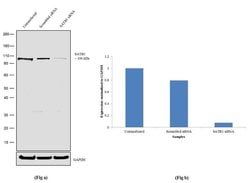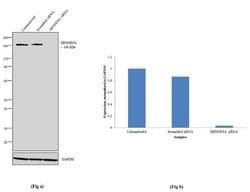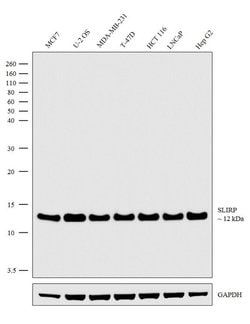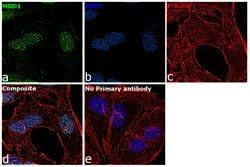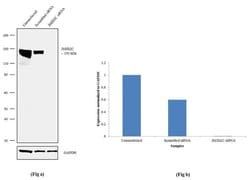SIRT1 Recombinant Rabbit Monoclonal Antibody (4H9L12), Invitrogen™
Manufacturer: Invitrogen
Select a Size
| Pack Size | SKU | Availability | Price |
|---|---|---|---|
| Each of 1 | 70-336-8-Each-of-1 | In Stock | ₹ 44,500.00 |
70-336-8 - Each of 1
In Stock
Quantity
1
Base Price: ₹ 44,500.00
GST (18%): ₹ 8,010.00
Total Price: ₹ 52,510.00
Antigen
SIRT1
Classification
Monoclonal
Concentration
0.5 mg/mL
Formulation
PBS with 0.09% sodium azide; pH 7.4
Gene Accession No.
Q96EB6
Gene Symbols
SIRT1
Immunogen
Protein corresponding to human SIRT1 [aa608-aa747]
Quantity
100 μg
Primary or Secondary
Primary
Target Species
Human
Product Type
Antibody
Isotype
IgG
Applications
ChIP Assay, Western Blot
Clone
4H9L12
Conjugate
Unconjugated
Gene
SIRT1
Gene Alias
75SirT1; AA673258; hSIR2; hSIRT1; mSIR2a; NAD-dependent deacetylase sirtuin-1; NAD-dependent protein deacetylase sirtuin-1; OTTHUMP00000198111; OTTHUMP00000198112; Regulatory protein SIR2 homolog 1; RP11-57G10.3; SIR2; Sir2a; SIR2alpha; SIR2L1; sir2-like 1; SIR2-like protein 1; SIRT 1; SIRT1; SIRT-1; SirtT1 75 kDa fragment; sirtuin 1; sirtuin 1 ((silent mating type information regulation 2, homolog) 1; sirtuin type 1
Host Species
Rabbit
Purification Method
Protein A
Regulatory Status
RUO
Gene ID (Entrez)
23411
Content And Storage
Store at 4°C short term. For long term storage, store at -20°C, avoiding freeze/thaw cycles.
Form
Liquid
Related Products
Description
- This antibody is predicted to react with Monkey, Pig, Cat
- Recombinant rabbit monoclonal antibodies are produced using in vitro expression systems
- The expression systems are developed by cloning in the specific antibody DNA sequences from immunoreactive rabbits
- Then, individual clones are screened to select the best candidates for production
- The advantages of using recombinant rabbit monoclonal antibodies include: better specificity and sensitivity, lot-to-lot consistency, animal origin-free formulations, and broader immunoreactivity to diverse targets due to larger rabbit immune repertoire
- NAD-dependent protein deacetylase sirtuin-1 (SIRT1) links transcriptional regulation directly to intracellular energetics and participates in the coordination of several separated cellular functions such as cell cycle, repsonse to DNA damage, metabolism, apoptosis, and autophagy
- SIRT1 can modulate chromatin function through deacetylation of histones and can promote alterations in the methylation of histone and DNA, leading to transcriptional repression
- It is essential in skeletal muscle cell differentiation and in response to low nutrients mediates the inhibitory effect on skeletal myoblast differentiation which also involves 5'-AMP-activated protein kinase (AMPK) and nicotinamide phosphoribosyltransferase (NAMPT).

